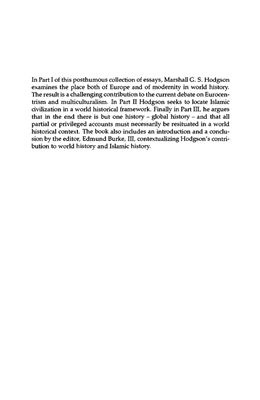Cambridge University Press, 1993. - 356 p.
Is the history of the mode world the history of Europe writ large? Or is it possible to situate the history of modeity as a world historical process apart from its origins in Weste Europe? In Part One of this posthumous collection of essays, Marshall G.S. Hodgson, a former professor of history at the University of Chicago, challenges adherents of both Eurocentrism and multiculturalism to rethink the place of Europe in world history. He argues that the line that connects Ancient Greeks to the Renaissance to mode times is an optical illusion, and that a global and Asia-centered history can better locate the European experience in the shared histories of humanity. In Part Two of the work Hodgson shifts the focus and in a parallel move seeks to locate the history of Islamic civilization in a world historical framework. Finally, in Part Three he argues that in the end there is but one history - global history - and that all partial or privileged accounts must necessarily be resituated in a world historical context. The book also includes an introduction by the editor, Edmund Burke III, contextualizing Hodgson's work in world history and Islamic history.
Is the history of the mode world the history of Europe writ large? Or is it possible to situate the history of modeity as a world historical process apart from its origins in Weste Europe? In Part One of this posthumous collection of essays, Marshall G.S. Hodgson, a former professor of history at the University of Chicago, challenges adherents of both Eurocentrism and multiculturalism to rethink the place of Europe in world history. He argues that the line that connects Ancient Greeks to the Renaissance to mode times is an optical illusion, and that a global and Asia-centered history can better locate the European experience in the shared histories of humanity. In Part Two of the work Hodgson shifts the focus and in a parallel move seeks to locate the history of Islamic civilization in a world historical framework. Finally, in Part Three he argues that in the end there is but one history - global history - and that all partial or privileged accounts must necessarily be resituated in a world historical context. The book also includes an introduction by the editor, Edmund Burke III, contextualizing Hodgson's work in world history and Islamic history.

